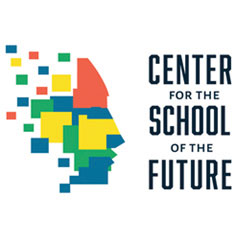By USU’s Center for the School of the Future (CSF)
Utah State Universities’ (USU) Aggie bull is a symbol of strength in Utah, and especially on its 25 campuses that stretch across Utah. USU’s land grant mission to serve Utah was extended even further in July 2021 when the Utah State Board of Education (USBE) approved the USU Board of Trustees’ proposal to authorize new charter schools in Utah.
With this approval in place, USU’s Center for the School of the Future (CSF) was designated by the USU Board of Trustees to assist in processing applications to authorize charter schools. CSF’s legislatively authorized mission is to foster 100% student learning proficiency in CSF client schools so all students are liberated from the constraints of limited opportunity. Consequently, CSF is truly, in Aggie-like fashion, bullish on student learning!
CSF’s organizational vision is to collaborate with education, business and government professionals who are passionate about 100% student proficiency. The nexus of our collaboration is in redesigning learning-outcome oriented systems in support of the professionals in public district and charter schools. These results are achieved with measurable outcome-oriented partnerships with universities, policy makers, private foundations, business professionals and other stakeholders. Our collaboration is animated by our shared passion to cultivate effective and sustainable deployment of research-based learning systems that are known to produce increased learning proficiency in K-12 students.
CSF’s core value proposition is to increase student learning as measured by metrics of sustained levels of proficiency. Linked values include: a) systems level interventions and solutions; b) practices anchored to learning sciences; c) decisions and actions grounded in ethics, equity of student learning outcomes, and relevant systems of knowledge; and d) setting the context for learning proficiency within the broader interests of society.
CSF was established in 1999 by the Utah Legislature, and was charged with promoting best practices in the state’s public education system and to encourage research development and cooperative relationships between public and higher education. Best practices were defined as the best process or system that effectively achieves, according to education science, an educational objective. CSF is charged to support the implementation of best practices in the public education system through professional development programs and dissemination of information, and with the purpose of contributing to the creation and maintenance of a public education system that continually and systematically improves itself by building upon the most effective education policies, programs, and practices and rejecting those that are less effective. It was the scope and the focus of these legislative charges that compelled USU’s Board of Trustees and leadership at The Center for the School of the Future to seek approval to authorize charter schools in Utah. Importantly, CSF’s mission has evolved from an identification of best practices focus, to a student learning outcome focus.
With strong tier I supports roughly 80% of charter schools will be successful in attaining learning and compliance targets. Even though all USU authorized charter schools receive strong tier I supports, some of these schools—roughly 20% will require more intensive professional supports to attain targeted compliance and student learning levels.
USU’s vision for authorizing focuses intensively on high-levels of student learning. This focus is conspicuously woven throughout USU’s six stage authorization process. The complete set of authorization stage documents are available at https://csf.usu.edu/projects-services/charter-school-authorizing After stage 1, a proposing group’s application is evaluated for merit, and either advanced in the process, or discontinued. The USU process is incrementally and increasingly collaborative from stage two to stage six.
USU’s accountability system, employs a MTSS system to help charter schools to attain the high-levels of student learning expressed in their charter agreement. With strong tier I supports roughly 80% of charter schools will be successful in attaining learning and compliance targets. Even though all USU authorized charter schools receive strong tier I supports, some of these schools—roughly 20% will require more intensive professional supports to attain targeted compliance and student learning levels. These schools will require both tier I and the more intensive tier II supports simultaneously, until they meet learning and compliance targets and can move back to receiving just tier I supports. Even with strong tier I and II supports, a few schools, roughly 5% of charter schools will require even more intensive supports to attain targeted compliance and student learning levels. These schools will receive tier I, II and III supports. These supports will continue until they attain targeted compliance and student learning levels, at which point they will drop back to receive tier I and II supports. If the school is able to sustain their performance with these supports, a determination will be made as to whether this performance can be sustained by returning to tier I services and rejoin the approximately 80% of schools in the CSF-USU charter school portfolio. You can review the entirety of USU’s accountability document at https://csf.usu.edu/projects-services/charter-school-authorizing
W. Edward Deming stated “Every system is perfectly designed to get the results it gets.” To get different results, systems must organize and execute differently. Often, very differently. USU’s charter school authorizing vision is bullish about student learning, and to achieve a high-level learning outcome, the design of learning systems is proactively addressed in the authorization process. Then, if a school is authorized, through a collaborative relationship with USU, the system design intentionally and coherently evolves to produce increasingly high levels of student learning.
USU is excited about this new emphasis placed upon high student learning outcomes in Utah’s authorized charter schools. For inquiries about USU’s charter school authorizing processes and services, contact Dr. David Forbush, Associate Director of The Center for the Future—david.forbush@usu.edu.







